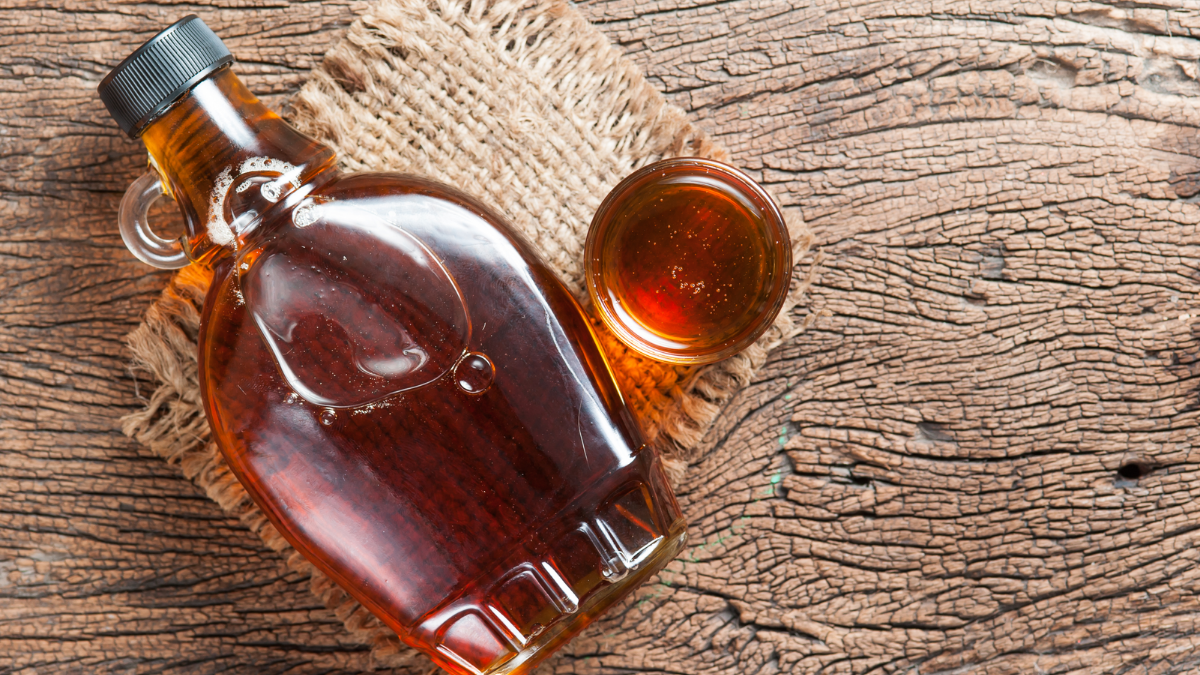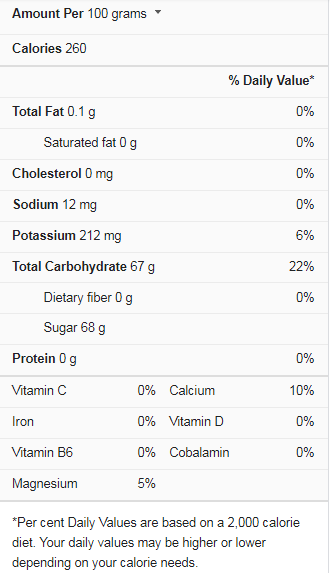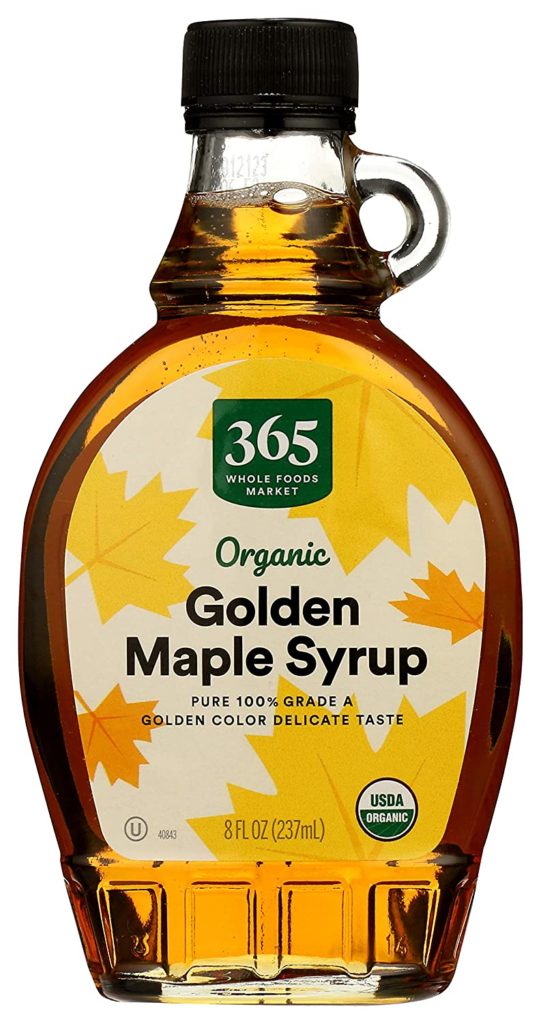Maple syrup is a sweetener made from maple trees. Drilling a hole in the bark of a sugar or black maple tree and collecting the sap that pours out is how it’s made. After that, the sap is condensed, increasing the sugar concentration from roughly 2% to over 66 percent.
In addition, this procedure darkens the colour to a characteristic golden brown. Maple syrup is produced in several locations around northern North America, including much of Canada and the East Coast and Midwest areas. Syrup producers are proud of their product’s quality and value its natural flavour.
Some even suggest that maple syrup is good for your health. What study has been done on the health advantages of maple syrup? Is it even possible to consume something so wonderful and keep healthy?
Maple Syrup Nutrition Facts
Maple Syrup’s Health Benefits
Maple syrup is a popular natural sweetener that is more nutritious and healthier than sugar. However, it’s critical to investigate the science underlying some of these claims. The sap, or circulating fluid, of sugar maple trees makes maple syrup, consumed in North America for ages. The province of Quebec in eastern Canada presently produces over 80% of the world’s supply.
There are two main steps in manufacturing maple syrup: The sap from a maple tree is poured into a container through a hole bored in the tree. The sap is heated until most water evaporates, leaving a thick, sweet syrup filtered to remove any contaminants. The result can be used to sweeten a variety of foods.
1. Reduced Cholesterol
Scientists have looked into the effects of maple syrup on cholesterol in animal research. Maple syrup was discovered to not only cut cholesterol in mice but also to prevent liver inflammation potentially.
2. Improved Mental Health
The research into maple syrup’s effects on brain health is still in its early stages, but the results point to some fascinating possibilities. Maple syrup appears to help prevent some proteins in brain cells from misfolding, tangling, and clumping. Alzheimer’s dementia and other neurodegenerative disorders are linked to these deformations. The syrup has also been associated with extended lifespans in Alzheimer’s patients in animal experiments.
3. Preventing Manganese Deficiency
Maple syrup’s high manganese level is a simple solution to prevent and cure manganese insufficiency. Manganese deficiency, while uncommon, can have major repercussions, including unusual bone growth and a diminished ability to heal wounds.
4. Maple Syrup’s Potential Hazards
The high sugar level of maple syrup poses the greatest health concern. Too much sugar in a person’s diet can cause various health problems and complications in diabetics. Before you consume maple syrup, keep the following in mind:
5. Decay of the Teeth
Because bacteria that cause tooth decay may feed on sugar in the mouth and grow, all sugar can encourage tooth disease, especially when highly concentrated. A person’s risk of developing dental cavities increases when they consume more sugar.
6. Complications of Diabetes
Carbohydrates in the form of sugars are found in maple syrup, but there is no fibre. As a result, consuming maple syrup can cause blood sugar and insulin levels. The sugar in maple syrup may cause problems for people with diabetes in particular.
7. Provides at least 24 Antioxidants
Free radicals generate oxidative damage, which is thought to be one of the causes behind aging and many diseases. Antioxidants can prevent oxidative damage and neutralize free radicals, potentially lowering your risk of certain diseases. According to research, maple syrup is a good source of antioxidants, and Maple syrup has 24 different antioxidants, according to one study. Darker syrups, such as Grade B, contain more healthy antioxidants than lighter syrups.
However, the total antioxidant content is still modest compared to the enormous amounts of sugar. According to one study, substituting your refined sugar with alternative sweeteners like maple syrup increases your total antioxidant consumption by the same as eating a single serving of nuts or berries. If you’re trying to reduce weight or improve your metabolic health, you’re better off avoiding sweeteners completely and opting for maple syrup instead.
8. Provides Additional Compounds
Maple syrup contains a variety of possibly beneficial compounds. Some of these compounds aren’t found in maple trees and are created when the sap is boiled to make maple syrup. Quebecol, called after the maple-producing province of Quebec, is one of them. Maple syrup’s active components have been demonstrated to aid slow the digestion of carbohydrates in the digestive tract and slow the proliferation of cancer cells. However, human investigations to validate the health impacts seen in test tubes are missing. Keep in mind that most maple syrup research, which is sometimes accompanied by misleading headlines, is funded by maple syrup manufacturers.
9. Maple Syrup Helps Boost Energy
Maple syrup’s manganese level aids in energy production and fatty acid and cholesterol synthesis. Just 1/4 cup of maple syrup is estimated to provide 90-100 percent of your daily manganese intake.
10. It Benefits Your Heart’s Health
Compared to the refined and processed variants available, the natural sweetener does not represent a serious hazard to your heart. Maple syrup has a good amount of zinc, and this mineral aids in protecting arterial walls from free radical damage and prevents artery hardening. Maple syrup’s manganese concentration also helps raise healthy cholesterol levels.
11. Maple Syrup helps Blood Sugar Levels.
Maple syrup may aid in the management of blood sugar levels. That doesn’t mean you have to complete the jar in two days! However, it may prove to be a healthier alternative. “Its antioxidant polyphenols, in combination with its plant hormone, abscisic acid, have been demonstrated to boost the body’s sensitivity to the blood-sugar-regulating hormone insulin,” according to ‘Healing Foods.” (Also see: 5 Natural Ways To Manage Your Sugar Levels If You Have Diabetes)
Is it Safe to Consume Maple Syrup Daily?
Maple syrup is sugar with no fibre; therefore, consuming too much of it will cause blood sugar and insulin levels to fluctuate. This could result in hunger, weight gain, and other negative health consequences. A person’s risk of developing dental cavities increases when they consume more sugar. Carbohydrates in the form of sugars are found in maple syrup, but there is no fibre. As a result, consuming maple syrup can cause blood sugar and insulin levels. Maple syrup, like coconut sugar, is a healthier sugar substitute, and it can’t be objectively classified as healthy.
As with all sweeteners, do so in moderation if you consume them. Pure maple syrup is a healthy alternative to sugar and artificial sweeteners in moderation. It’s completely natural and organic, full of vitamins and nutrients, and can be substituted for sugar in many recipes.” said Janette Gaumer. The experiment looked at how this impacted particular chemicals involved in liver metabolism. Maple syrup was discovered to have the capacity to inhibit ammonia production. While modest ammonia levels are present in human blood and are considered healthy, excessive amounts can harm the liver.
Is Maple Syrup Healthier than Honey?
Instead of processed sugars, honey and maple syrup are healthier sweeteners. Honey has more carbs, protein, and calories than maple syrup, but maple syrup has more fats. Honey has a higher glycemic index than other sugars. It has more vitamin C, B3, B5, and B6, while maple syrup contains more vitamins B1 and B2. Honey has a nutritional advantage over maple syrup in that it contains no fat. However, the fat content of maple syrup is quite low, with only 0.1 gram of fat per tablespoon.
Another advantage of honey over maple syrup is that honey contains additional vitamins, such as B-6 and C, whereas maple syrup does not. In comparison to honey, real maple syrup contains much more calcium, iron, magnesium, potassium, zinc, copper, and manganese. These minerals help your body in various ways, including cell development, red blood cell health, and immune support. Honey is best for low-fat diets, while maple syrup is best for low-calorie, low-carb, and low-glycemic-index diets. The large disparity in average serving sizes of honey and maple syrup, on the other hand, should be taken into account.
Is Maple Syrup Healthy than Sugar?
If you’re going to use sugar in a dish, you might as well use maple syrup instead of refined sugar because it’s somewhat healthier. The truth is that maple syrup still contains a lot of sugar. Adding calcium or potassium to your diet by eating several tablespoons of maple syrup every day would be extremely bad. Sugars have a greater glycemic index than maple syrup. However, maple syrup is preferable because it has a lower glycemic index than cane sugar. The glycemic index of real maple syrup is low, and Maple syrup has a glycemic index of about 54.
On the other hand, Table sugar has a glycemic index of about. As a result, maple syrup elevates blood sugar levels more slowly than normal sugar. Minerals like manganese and zinc are found in modest amounts in maple syrup. Maple syrup is a healthier option than processed sugars and various other sweeteners. Maple syrup is an excellent alternative sweetener because it has fewer calories and a greater mineral concentration than honey. Just make sure the maple syrup you use is 100 percent pure!
Is Maple Syrup Safe for Diabetics to Consume?
Maple syrup is sometimes referred to as one of the most diabetic-friendly sugar replacements. For the time being, people with diabetes should remember that, while maple syrup has certain potentially beneficial components, it is still a food that should be consumed in moderation and small amounts, just like other intense carbohydrate sources. As you can see, maple syrup has a lower glycemic index than table sugar, which doesn’t cause as much blood sugar surge.
However, it is not as low as agave, a low glycemic index sweetener. Stevia, monk fruit sweetener, raw honey, molasses, and yacon syrup are sweet maple syrup substitutes that are also good for people with diabetes because they are low in calories and low in fructose. Diabetes. Both honey and maple syrup has a lot of sugar in them. Honey has a glycemic index of 61, which is somewhat higher than maple syrup’s 54, making honey a moderate glycemic index food.
Does Maple Syrup Raise Cholesterol?
Added sugars like table sugar and high fructose corn syrup have reduced HDL (“good”) cholesterol levels. According to the American Heart Association, women should consume no more than 100 calories (6 teaspoons) per day from added sugars, while men should consume no more than 150 calories (9 teaspoons). The American Heart Association recommends that women consume no more than 25 grams of sugar per day and men consume no more than 36 grams. Scientists discovered that fed maple syrup had lower cholesterol levels than those not. Scientists also examined the livers of mice fed a high-fat diet to look for genes that can hurt an organism.
Maple syrup is one of the most flavorful sweeteners in coffee, but it’s not widely used compared to other additives. In modern coffee shops and chains, artificially flavoured syrups are the most popular sweeteners, but sugar and artificial sweeteners are also popular. Several maple syrup replacements can be used in a 1:1 ratio while baking, and honey, molasses, corn syrup, or agave nectar are good options. The baked items will have a different flavour, but due to the texture of these products, the result will be just as moist as if maple syrup had been used.
Conclusion
Maple syrup has a very low, nearly non-existent nutritional value. However, several minerals are present in significant amounts. One tablespoon of maple syrup includes about 33% of your daily manganese requirement, necessary for strong bones. Maple syrup also contains the following minerals: Real maple syrup is a plant-based product that, like many other plant-based foods, is high in antioxidants, which protect the body from the harmful effects of oxygen. This, together with the nutrients it contains, leads to several health benefits:




